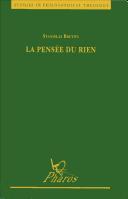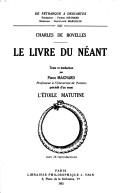| Listing 1 - 10 of 37 | << page >> |
Sort by
|

ISBN: 9024232171 9789024232178 Year: 1992 Volume: 2 Publisher: Kampen Kok Pharos
Abstract | Keywords | Export | Availability | Bookmark
 Loading...
Loading...Choose an application
- Reference Manager
- EndNote
- RefWorks (Direct export to RefWorks)
Nothing (Philosophy) --- 111 --- Nothingness (Philosophy) --- Nihilism (Philosophy) --- Ontology --- Metafysica. Ontologie --- 111 Metafysica. Ontologie
Book
ISBN: 0813219159 9780813219158 9780813218632 0813218632 Year: 2011 Volume: v. 54 Publisher: Washington, D.C.
Abstract | Keywords | Export | Availability | Bookmark
 Loading...
Loading...Choose an application
- Reference Manager
- EndNote
- RefWorks (Direct export to RefWorks)
Nothing (Philosophy) --- Ontology. --- Nothingness (Philosophy) --- Nihilism (Philosophy) --- Ontology --- Being --- Philosophy --- Metaphysics --- Necessity (Philosophy) --- Substance (Philosophy)
Book
ISBN: 9401205884 1435647106 9781435647107 904202402X 9789042024021 9789401205887 904202402X 9789042024021 Year: 2008 Publisher: Amsterdam New York, NY Rodopi
Abstract | Keywords | Export | Availability | Bookmark
 Loading...
Loading...Choose an application
- Reference Manager
- EndNote
- RefWorks (Direct export to RefWorks)
In this book, probably for the first time in Western philosophy, an attempt has been made to point out and systematically explicate the problem scope of the Nothing (which is called Nihil in the book) and to try to explain the springhead of the excessive negativity, inherent only in the human being, or in other words, the springhead of the human’s natural nihilism. Nihilism is treated here not as a posture, pose, or an ideological attitude, but as the spread of the human metaphysical nucleus, of Nihil. Nihilistic annihilation, manifesting itself as the road of the naming of Nihil and of the production of thingly crystals (artificial world) as a result of that naming, usually is called “history”. Names of Nihil (language phenomena), being the antithesis of Nihil, falsify and cover up Nihil itself, turning it into “supreme” being, e.g. into “the One”, “God”, “Substance”, “Matter”, “Spirit”, ad infinitum . This book should be interesting not only to philosophers or humanitarians, but also to all those who concern themselves with the total human condition.
Nothing (Philosophy) --- Existentialism. --- Existenzphilosophie --- Ontology --- Phenomenology --- Philosophy, Modern --- Epiphanism --- Relationism --- Self --- Nothingness (Philosophy) --- Nihilism (Philosophy)
Book
ISBN: 1438472692 9781438472690 9781438472676 1438472676 Year: 2019 Publisher: Albany
Abstract | Keywords | Export | Availability | Bookmark
 Loading...
Loading...Choose an application
- Reference Manager
- EndNote
- RefWorks (Direct export to RefWorks)
Zhuangzi and the Becoming of Nothingness offers a radical rereading of the Daoist classic Zhuangzi by bringing to light the role of nothingness in grounding the cosmological and metaphysical aspects of its thought. Through a careful analysis of the text and its appended commentaries, David Chai reveals not only how nothingness physically enriches the myriad things of the world, but also why the Zhuangzi prefers nothingness over being as a means to expound the authentic way of Dao. Chai weaves together Dao, nothingness, and being in order to reassess the nature and significance of Daoist philosophy, both within its own historical milieu and for modern readers interested in applying the principles of Daoism to their own lived experiences. Chai concludes that nothingness is neither a nihilistic force nor an existential threat; instead, it is a vital component of Dao's creative power and the life-praxis of the sage.
Nothing (Philosophy) --- Nothingness (Philosophy) --- Nihilism (Philosophy) --- Ontology --- Zhuangzi. --- 莊子. --- Chuang-tzu.

ISBN: 2711620581 9782711620586 Year: 1983 Volume: 44 Publisher: Paris Vrin
Abstract | Keywords | Export | Availability | Bookmark
 Loading...
Loading...Choose an application
- Reference Manager
- EndNote
- RefWorks (Direct export to RefWorks)
Christian fundamental theology --- Nothing (Philosophy) --- Néant (Philosophie) --- Nothingness (Philosophy) --- Nihilism (Philosophy) --- Ontology --- Nothing (Philosophy). --- Néant (Philosophie)
Book
ISBN: 3451202492 Year: 1984 Publisher: Freiburg Herder
Abstract | Keywords | Export | Availability | Bookmark
 Loading...
Loading...Choose an application
- Reference Manager
- EndNote
- RefWorks (Direct export to RefWorks)
Mysticism --- Nothing (Philosophy) --- Ontology --- #GROL:SEMI-248.2 --- #gsdb3 --- 248 --- Nothingness (Philosophy) --- Nihilism (Philosophy) --- Spiritualiteit. Ascese. Mystiek. Vroomheid --- Christian spirituality
Book
ISBN: 2130544371 9782130544371 Year: 2006 Publisher: Paris PUF
Abstract | Keywords | Export | Availability | Bookmark
 Loading...
Loading...Choose an application
- Reference Manager
- EndNote
- RefWorks (Direct export to RefWorks)
Nothing (Philosophy) --- Metaphysics --- Néant (Philosophie) --- Métaphysique --- History --- Histoire --- Ontology --- Philosophy, European --- European philosophy --- Being --- Philosophy --- Necessity (Philosophy) --- Substance (Philosophy) --- Nothingness (Philosophy) --- Nihilism (Philosophy) --- History of philosophy
Book
ISBN: 9781438473093 9781438473116 1438473117 1438473095 1438473109 Year: 2019 Publisher: Albany : SUNY Press,
Abstract | Keywords | Export | Availability | Bookmark
 Loading...
Loading...Choose an application
- Reference Manager
- EndNote
- RefWorks (Direct export to RefWorks)
"In the field of philosophy, the common view of philosophy as an essentially Western discipline persists even today, while non-Western philosophy tends to be undervalued and not investigated seriously. In the field of Japanese studies, in turn, research on Japanese philosophy tends to be reduced to a matter of projecting existing stereotypes of alleged Japanese cultural uniqueness through the reading of texts. In Nothingness in the Heart of Empire: The Moral and Political Philosophy of the Kyoto School in Imperial Japan, Harumi Osaki resists both these tendencies. She closely interprets the wartime discourses of the Kyoto School, a group of modern Japanese philosophers who drew upon East Asian traditions as well as Western philosophy. Her book lucidly delves into the non-Western forms of rationality articulated in such discourses, and reveals the problems inherent in them as the result of these philosophers' engagements in Japan's wartime situation, without cloaking these problems under the pretense of "Japanese cultural uniqueness." In addition, in a manner reminiscent of the controversy surrounding Martin Heidegger's involvement with Nazi Germany, the book elucidates the political implications of the morality upheld by the Kyoto School and its underlying metaphysics. As such, this book urges dialogue beyond the divide between Western and non-Western philosophies, and beyond the separation between "lofty" philosophy and "common" politics"--
Book
ISBN: 9788822257680 8822257685 Year: 2009 Publisher: Firenze Olschki
Abstract | Keywords | Export | Availability | Bookmark
 Loading...
Loading...Choose an application
- Reference Manager
- EndNote
- RefWorks (Direct export to RefWorks)
Nothing (Philosophy) --- Philosophy, Medieval. --- Néant (Philosophie) --- Philosophie médiévale --- Philosophy, Medieval --- Medieval philosophy --- Scholasticism --- Nothingness (Philosophy) --- Nihilism (Philosophy) --- Ontology
Book
ISBN: 0631115404 Year: 1976 Publisher: Oxford Blackwell
Abstract | Keywords | Export | Availability | Bookmark
 Loading...
Loading...Choose an application
- Reference Manager
- EndNote
- RefWorks (Direct export to RefWorks)
Negation (Logic) --- Proposition (Logic) --- Nothing (Philosophy) --- Nonbeing --- Non-being --- Nothingness (Philosophy) --- Negative propositions --- Metaphysics --- Ontology --- Nihilism (Philosophy) --- Language and logic --- Logic --- Judgment (Logic)
| Listing 1 - 10 of 37 | << page >> |
Sort by
|

 Search
Search Feedback
Feedback About UniCat
About UniCat  Help
Help News
News